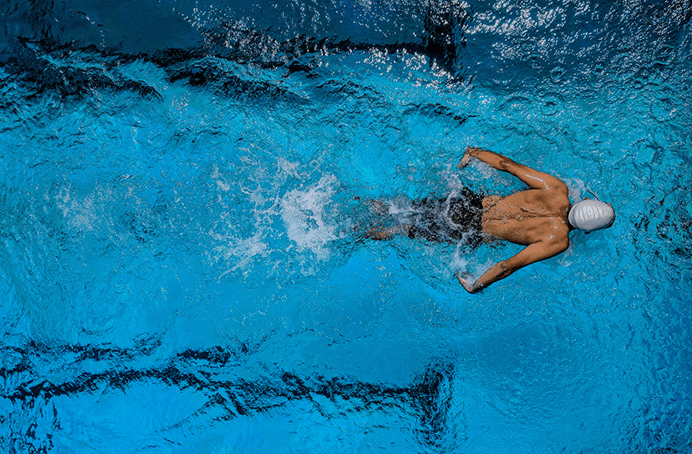SPORTS
I was diagnosed with epilepsy, what now? Can I practice sports? Which physical activities are most adequate for people with this chronic condition? And should I, or should I not, tell the gym I have epilepsy? This and so many other questions wander the mind of someone who was just diagnosed with epilepsy. It’s natural it happens, after all this is a new and unknown situation for someone who’s experiencing for the first time the diagnosis of a chronic pathology.

I was diagnosed with epilepsy. What changes in physical activity?
With appropriate support and safety precautions there’s not much to avoid. If epileptic seizures are controlled by epilepsy medication, you may not need to take any great safety precautions than anyone else.
Some people state that they have lesser chances of having an epileptic seizure when they remain active. And, in fact, to some people with epilepsy taking part in sports and leisure activities can benefit the management of this condition as well as overall physical condition. However, there are some people with epilepsy that believe the practice of strenuous exercise can boost the risk of epileptic seizures.
Can people with epilepsy practice sports?
How can I decide which physical activities are the most adequate for me?
Anyone, whether or not they have epilepsy, must adequate and assess the risks and benefits of the practice of physical activities, whatever the type of sport one likes or aims to practice. There are several physical activities with additional risks of lesions, falls, or others, but we should always bear in mind that the regular and moderate practice of physical activities entails benefits for our physical and mental well-being, stress and anxiety reduction and, above all, the overall well-being of the organism. Therefore, the answer to this question is a simple one: balance.
Choose a balanced activity and don’t forget to weight the risks and benefits, selecting any activity which benefits outweigh the risks and taking into consideration your overall physical condition and the specificity of your condition as a person with epilepsy.
As a general rule, when you start a physical activity at an institution/gym you need to fill a medical form so that the institution has a record of your overall condition and evaluates whether or not you’re able to start practicing a sport. Before you enroll in any gym or club please talk to your doctor so that he or she can help you evaluate if your choice is safe. If epilepsy won’t affect your safety or other’s there’s no need to inform others of your condition. To understand if it’s safer to inform others about your epilepsy, answer the questions below and assess the risk:
01_How frequent are your epileptic seizures?
02_What are the characteristics of your epileptic seizures?
03_Do you feel some warning before an epileptic seizure?
04_How long do your epileptic seizures usually last?
05_Which factors can cause you to have an epileptic seizure (blinking lights, excitement, stress, sleep disturbances)?
06_If you have an epileptic seizure, what risks are there for you and others?
07_If you have an epileptic seizure, does the place you chose have available support?
Should I inform
other people
about
my condition
as a person
with epilepsy?
Now that you’ve assessed the risk, read about some types of sports and choose the one most adequate to you and which practice gives you more satisfaction and pleasure.
Some types of Sports
Read more

WATER SPORTS
Swimming, diving, canoeing, surf, sailing, among others - These sports can be a good option for people with epilepsy that have their epileptic seizures under control by medication. If you don’t have your epileptic seizures under control yet, there are some safety concerns you need to pay attention to. Don’t practice a water sport alone; be sure someone knows about your epilepsy in case rescuing you is needed and use a life vest if falling to the water is a danger.

OUTDOOR SPORTS ACTIVITIES

Walking or running - This type of activities can be practiced by people with epilepsy and benefits their health and the overall well-being of the organism. Nevertheless, you should be attentive to some common precautions and general measures. When you leave for a walk or to run you should try to do so with someone who knows about your condition and can help in case of need (epileptic seizure). If you choose to go by yourself, bring your phone, be reachable and opt by a device with tracking capabilities. Choose well-lit calm routes (with low traffic). Avoid busy streets, rivers and canals.
Cycling – Normal safety precautions for any cyclist include the use of high visibility clothing and a safety helmet. If you still have seizures, try to avoid routes that go by very busy streets, rivers, canals or very difficult trails. Choose to ride on bike paths and be safe during your trip.


Hiking – Heights are a potential danger for anyone with epilepsy. That doesn’t mean you can’t hike, but it means you’ll need to carefully evaluate safety concerns related to you and other people in your group. There is a small amount of evidence to suggest that climbing fast to a high altitude can increase the risk of someone having a seizure. If you want to hike at high altitudes consult your doctor first.
INDOOR SPORTS ACTIVITIES

Gym If you haven’t had seizures in at least 12 months you can use most gym equipment to exercise. Either way there are some exercises and equipment to avoid so that you and the remaining people at the gym can train with the utmost safety. Before frequenting a gym consult your doctor about the most adequate training for you, considering your condition and individual case. Also ask for advice from the staff at the gym about which exercises, classes and equipment can you do, attend or use with the utmost safety.
Yoga – Practicing yoga can be beneficial for some people with epilepsy, including in the perspective of fitness. This type of physical activity is relaxing, however and despite the deep breathing exercises applied in yoga, some forms of yoga can involve extreme breathing techniques and may need extra care from people with epilepsy.

EXTREME SPORTS

Bunjee jumping, hang gliding, snowboarding and whitewater rafting - These activities are extreme sports, with a high concentration of excitement, skill and danger. The follow-up with your healthcare team before engaging these sports is essential, taking these activities involve usually speed, height and high physical energy, and consequently could have some restrictions.
COLLECTIVE SPORTS
Football, handball, basketball, among others - There is no evidence that people with epilepsy should avoid collective sports such as football, handball, basketball or rugby, among others. However, following normal safeguards is necessary to adequately protect your head to avoid strong blows and other types of lesions.

Now that you have some notions and counsels regarding different types of sports and respectively associated safety conditions, remember you can and should regularly and moderately practice physical exercise, because most of the time it has benefits that outweigh the risks. Still, always consider your neurologist’s opinion as well as the opinion of the sports professionals who will guide and counsel you regarding the most appropriate physical activities to your condition.




